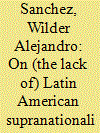|
|
|
Sort Order |
|
|
|
Items / Page
|
|
|
|
|
|
|
| Srl | Item |
| 1 |
ID:
158962


|
|
|
|
|
| Summary/Abstract |
In June 2016, the Colombian Government and the FARC insurgent movement signed a ceasefire agreement, which brings the two sides one step closer to putting an end to over five decades of war. Unfortunately, Latin America has a rich history of insurgent movements, particularly during the cold war era, some of which continue to operate today. Most of these movements disappeared due to military operations, though some did so via peace negotiations. This essay aims to discuss the various ends of Latin American insurgencies to answer whether, indeed, insurgents can be negotiated with.
|
|
|
|
|
|
|
|
|
|
|
|
|
|
|
|
| 2 |
ID:
154341


|
|
|
|
|
| Summary/Abstract |
This commentary discusses the state of supranationalism in Latin America. We will enumerate the numerous regional organizations in the Western Hemisphere, and also discuss their successes and failures at regional integration. While integration has had some successes, supranationalism has yet to flourish among Latin American states and it will probably not for the immediate future. Empirical evidence suggests that, while inter-state warfare is scarce in the region, there are still too many inter-state tensions, including ongoing border disputes, as well as occasional incidents, which prevent supranationalism from taking hold. This explains the lack of a North Atlantic Treaty Organization-esque type South American bloc. Nevertheless, small-scale integration projects have been successful, like visa waivers systems, educational programs or defense-cooperation projects. Ultimately, in a changing global geopolitical system, the distrust for supranationalism remains the same in Latin America.
|
|
|
|
|
|
|
|
|
|
|
|
|
|
|
|
|
|
|
|
|